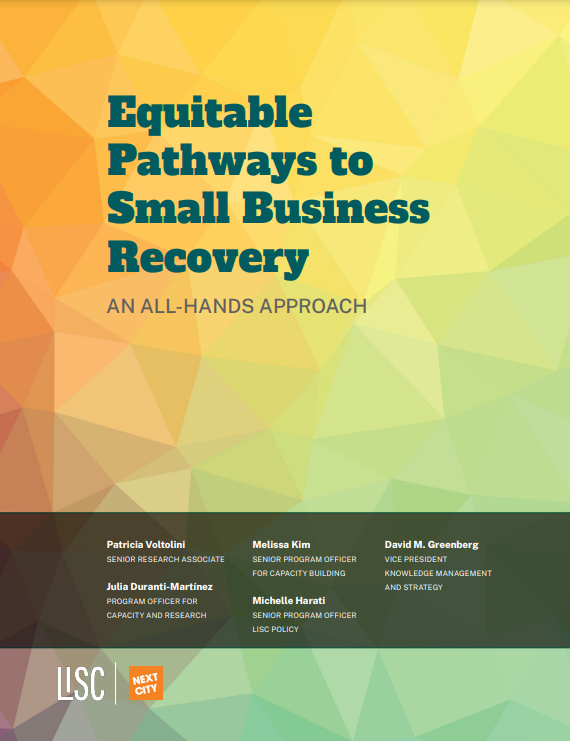A new playbook from LISC and Next City offers a framework for paving equitable pathways to small business success, and lays out concrete strategies for supporting capital access, small business capacity, and commercial real estate. Two of its authors explain why that’s so important.
The long pandemic – now in its fourth major wave in the US, with a death toll reaching over 900,000 – has so deeply impacted daily life that it is challenging to take stock of its effects.
On the economic front, small business closures were one of the most visible early pandemic losses. As with so many aspects of COVID-19, these closures had a more severe impact on people of color. In the first months of the pandemic, the number of active Black-owned businesses fell by 41 percent, and the number of Latinx-owned businesses fell by 32 percent, or approximately 1.5 to two times the overall closure rate.
By 2022, what is becoming clearer is that the effects on small business have extended beyond the early, public health-related closures: the pandemic years have exacerbated the gulf between large corporations and smaller establishments. (Corporate wealth both tracks with and helps create the yawning wealth gap for individuals – between mid-March 2020 and October 2021, U.S. billionaires saw their net worth rise 70 percent, to over $5 trillion, while renters around the country now owe landlords $23 billion.)
For example, 2021 ended with S&P 400 companies reporting an almost 60 percent increase in profits, compared with the last quarter of 2019 – before the pandemic started. In contrast, in January of 2022, two-thirdsof small business owners reported that the pandemic negatively impacted them moderately or a great deal, according to the Census’s Small Business Pulse Survey.
Non-business owners may experience this power and wealth shift between small business and large corporations in the form of shuttered main street businesses replaced by grocery delivery services–or by nothing at all. But for business owners themselves, especially entrepreneurs of color, women-owned firms, and/or immigrant-owned establishments, the direct loss of livelihood and wealth has been devastating.
Fortunately, the pandemic has also sparked experimentation and extraordinary efforts, especially at state and local levels, to support equitable small business recovery. (LISC itself has been involved in this work, supporting 12,000 businesses with, in 2020 – about 90 percent to entrepreneurs of color and 66 percent to women-owned businesses.)
A detailed new playbook, Equitable Pathways to Small Business Recovery: An All-Hands Approach, is a collaboration between LISC and Next City and was supported by the Bill and Melinda Gates Foundation. It documents promising strategies employed by state and local government – importantly, in partnership with many different stakeholders, from organizations that provide small business development services, to CDFIs, to local and ethnic chambers of commerce representing BIPOC entrepreneurs themselves.
To develop the playbook, we met regularly with public and elected officials, and representatives of these varied sectors. Recognizing that local governments are not all alike, we intentionally we formed these cohorts to represent regional diversity, including large, coastal cities; rural communities; small to mid-sized cities; and older, industrial areas.
The result is both a framework for pursuing equitable pathways to small business success, and a set of contextualized strategies related to capital access, small business capacity, and commercial real estate. Because the federal government plays a critical role, the report concludes with a review of opportunities and challenges at that level of government as well.
 David M. Greenberg, VP of Knowledge Management & Strategy
David M. Greenberg, VP of Knowledge Management & Strategy
David is the vice president of Knowledge Management and Strategy for LISC, where he evaluates its impact in 33 cities and rural areas, and supports the learning and evaluation needs of local offices and national programs. Before LISC he was a Senior Associate with MDRC, directed policy and advocacy for a coalition of 90 community housing organizations in New York City and organized with homeless men and women in the municipal shelter system. He holds a Ph.D. in urban and regional planning from MIT, and is a part-time faculty member at The New School’s Milano School of Urban Policy.
@dvm_greenberg
 ABOUT THE AUTHOR
ABOUT THE AUTHOR
Patricia Voltolini, Senior Research Associate
Patricia is a mixed-methods researcher and part of LISC Research and Evaluation team. Her current work involves evaluating LISC’s impact in communities across the country, developing innovative research that explores and highlights topics of emerging importance in the field, and assisting data and research needs of local offices and national programs. Prior to joining LISC she was a local economic development consultant conducting research and strategic planning for downtown and commercial corridor revitalization projects throughout the country. She holds a Ph.D. in Planning and Public Policy from Rutgers University, and is a Visiting Assistant Professor in the Graduate Center for Planning and Environment at the Pratt Institute.
